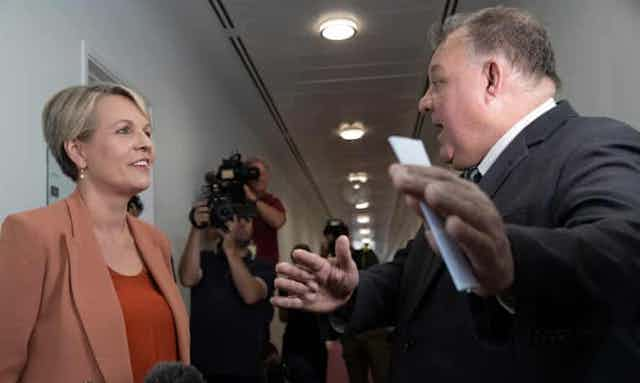Australians love a fiery contest, whether on the sporting field or in the corridors of Canberra. Which is why this week’s spat between Tanya Plibersek and Craig Kelly, which played out in front of cameras still rolling from the former’s media conference, blew up into a big story about the latter.
Plibersek was busy taking Kelly to task for spreading COVID-19 misinformation, and calling on Prime Minister Scott Morrison to stop him doing it, when it became apparent Kelly was standing just metres away.
In the ensuing three minutes, the two accused each other of spreading misinformation, misrepresenting the science, and failing to protect the Australian community from the COVID pandemic.
Just for the record, Kelly is in the wrong about a lot of the science. During the pandemic he’s become a prolific Facebook spruiker of unproven coronavirus treatments such as ivermectin and hydroxychloroquine, while casting doubt on COVID vaccines.
But we’re not here to mark report cards. Instead, we want to ask: was Plibersek’s approach a sensible way to deal with misinformation?
Win-win for the combatants, but not for science
In political terms, both protagonists scored a win of sorts. Kelly, who is battling to retain his seat, got to look like a fighter who sticks up for his beliefs (which are presumably sincerely held but are way out of step with the science). Plibersek, meanwhile, landed an indirect blow on Morrison, who reacted to the scuffle by briefing the media that he had finally hauled Kelly into line.
Plibersek has no doubt seen how QAnon-inspired conspiracies have divided the US Republican Party, and presumably relishes the chance to sow similar division among the Coalition. (She also pointed out her mother lives in Kelly’s electorate, and as such would be vulnerable to the effects of misinformation on his constituents.)
But it’s hard to see how any of this really helps the wider public, who need timely and relevant information to help negotiate the pandemic.
As researchers who investigate the intersection between science, communication and politics, we know many of the scientific “debates” prosecuted by Kelly and his fellow contrarians aren’t actually aimed at getting to the truth.
As we saw during the interminable climate policy wars, these debates are often matters of personal pugilism rather than objective consideration of the evidence.
A better way
Here are some pointers, informed by the evidence, on what to do next time you’re faced with a COVID contrarian on your Facebook feed, at a family barbeque, or while roaming the parliamentary press gallery (OK, the latter is probably fairly unlikely).
- First, ask yourself whether there’s any point engaging at all. While misinformation can be dangerous, especially in a pandemic, some people just aren’t open to changing their mind.

Check yourself. We all fall for misinformation sometimes. So before critiquing other people’s claims, audit what you think you know to see whether the evidence and the experts back your views. Look at the evidence like a scientist, not a barrister. Barristers are great when you need someone to back you up in court, but their approach typically involves gathering all the evidence to support a particular claim. Good scientists, in contrast, look at all the evidence first, come up with a hypothesis, then test it by looking at all the evidence against it. If this sounds like a lot to manage by yourself, you could see whether the claim has already been fact-checked by a trustworthy source, or ask whether a scientist will check it for you.
Have a specific behavioural objective and tailor your approach accordingly. Are you trying to get someone to wear a mask in crowded places? To get vaccinated? To stop posting false claims on the internet? Having a specific outcome in mind will help you focus your efforts and measure success.
Don’t play misinformation whack-a-mole. You could spend years trying to debunk the dodgy claims about COVID-19. Instead, familiarise yourself with the common themes, and learn to recognise the techniques and cognitive tricks that can make misinformation appealing to some people .
Don’t just hit them with facts. Facts, while crucial for good policy, are less persuasive than you might think, as any exasperated climate scientist will confirm. Instead, show them how much you care about the issue and focus on earning their trust, which can be far more potent than expertise at changing someone’s mind.
Read more: Facts won't beat the climate deniers – using their tactics will
Admit when you don’t know something. Don’t pretend you’re an expert on every facet of the pandemic — nobody is. Instead, use one of the most powerful phrases in science: “I don’t know. Let’s find out together”.
Show you’re really listening. You might be surprised to learn that listening can make you more persuasive. Be open to finding out new things, even if all you learn is where your crazy uncle gets his wacky ideas. And ask questions — research shows even this simple act can encourage people to adopt more healthy behaviours.
Keep politics and personal insults out of it. Calling people Sheeple or Karens doesn’t win hearts or minds. Treat it as a dialogue, not a slanging match, and be aware things can rapidly become adversarial on social media (and in Canberra corridors).
Read more: To get conservative climate contrarians to really listen, try speaking their language
Don’t be impatient. Changing people’s behaviours is hard. Otherwise the world wouldn’t be in this pickle. It might take a few attempts over the course of a few weeks, or months or years. Or, you know, you might never get there.
Finally, have a pre-prepared exit strategy. If you’ve realised you’re butting your head against a brick wall, bail out gracefully. Honestly, life’s too short.

